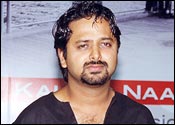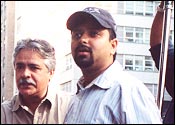Home > Movies > Interviews
The Rediff Interview
/ Nikhil Advani
Nikhil Advani turns independent with Little Women!
Sukanya Verma |
June 15, 2004
 Nikhil Advani is sporting a beaded bracelet from Turkey around his wrist. "To ward off evil eyes," he says.
Nikhil Advani is sporting a beaded bracelet from Turkey around his wrist. "To ward off evil eyes," he says.
He hasn't been sleeping too well either. His eyes look tired. His body language bears a sign of fatigue. Advani is brainstorming with his co-writer Saurabh Shukla on the Indian version of Louisa May Alcott's universally loved book, Little Women. This film is for his own production, Nikhil Advani Films.
A couple of months ago, he was in the middle of scripting a thriller for Yash and Karan Johar's Dharma Productions, the banner under which he made his directorial debut, Kal Ho Naa Ho.
Speculations are on that Advani and the Johars had a fallout. But in an exclusive interview with Sukanya Verma, the director dismisses the rumours saying, "Dharma Productions is and always will be home." And here's more about his new venture:
Why did you decide to turn independent producer?
It has been a dream. It is the ultimate goal of any creative person or director that at the end of the day, he must have complete control over whatever he is doing.
Even while I worked as an assistant director with Karan Johar or Aditya Chopra or Sudhir Mishra, I have always been involved in the production.
When you or your director wants a certain quality, you need to be able to take decisions. Whether it is location, hiring a car, casting an actor, you need to take financial decisions also, so that the creative things a director wants are achieved. I used to assist Karan Johar and at the same time I used to be in sync with Yash Johar. I have always been obsessed with production. In fact, if I wasn't doing this [his new film] right now, I would be executive producer for Karan Johar's film.
What exactly does an executive producer do?
An executive producer is the one who brings in the money for financing. The executive producer executes that money. He does the budget and he sticks to that budget, which is more important. He makes sure that everything the director wants or the direction department requires is available. The line between production and direction, as far as I am concerned, will always overlap.
Why did you decide to make your own film now?
The film slated for Dharma Productions was supposed to start in August. I would have finished writing by December. Karan wants to start his own film in December. He had already taken two-and-half years off with Kal Ho Naa Ho. His film is on such a colossal scale. I don't think Dharma Productions wanted to do any other film at the same time. I would have to wait till June-July next year.
The Johars said graciously, "Listen, the industry has very short memory. Since you are a director, you need to go out and do it as soon as possible."
If I am supposed to work as an independent director, I would rather work with the Johars. They are wonderful. They are the best producers. Karan is completely involved in the creative aspect also. Rather than work outside with other independent producers, why not produce a film yourself? It is a big decision. It is a very scary decision. Every day I think whether I did the right thing or not.
What the Johars feel about it?
They were more like, "You need to go out and make a film." What kind of film -- whether you work under other big producers or produce yourself -- that decision, they left to me.
How did Jhamu Sughand come into the picture?
Jhamu Sughand saw the promos of Kal Ho Naa Ho. He had called me and asked me to do a film for him then. At that point I told him I am not doing anything other than a Dharma Productions film. He said he would like to be part of my film at any time whenever I am ready to step out, he would like to back me.
When I decided to do a film on my own, I spoke to him. He was absolutely keen on doing it.
Jhamu Sughand is the presenter. And you are the producer, is that right?
He is the co-producer as well as the presenter. Nikhil Advani Films [is the principal producer].
How did you feel when you shifted from the Dharma Productions office to this one?
For me, to leave Dharma Productions has been, more than anything else, an emotional decision. They provided me with everything. They gave me a home, literally. They put a roof above my head and a ground to walk on. They set a launch pad for me to be able to take it further -- to be able to interact with people like Jhamu Sughand or Boney Kapoor or Ramesh Taurani and the actors. They have given me everything.
I didn't want to even broach the topic [of turning independent producer]. I would be completely happy being an executive producer in Karan's film. It is a huge challenge to be an executive producer in a Karan Johar film, especially the film he is trying to make. Somewhere, Karan recognised that I wanted to prove, not only to the audience but myself that I needed to make a film where the stamp is completely mine.
But sooner or later, you would gone ahead as a independent filmmaker?
I don't know. For me Dharma Productions is and always will be home. Right now, I am out of home and trying to adjust. The adjusting process is very critical.
How important was it for you to branch out on your own?
Not very important. They are fantastic producers. They gave me complete freedom to do whatever I wanted. I got an opportunity. Since this opportunity presented itself, I took it. I have always been crazy about film production. Why not take it? Maybe this option will never come again. What if the second film is not as big as the first?
But there have been rumours suggesting there are problems between you and the Johars, ever since Kal Ho Naa Ho came out. What do you have to say about that?
I would be lying if I said it doesn't affect me. It does affect me terribly. They are family to me. When I opened this office, Yash Johar was the first to come for the pooja. I have known the way people are always looking to run him [Karan] down. Looking for small-small excuses -- whether it is the films he makes, the clothes he wears or the people he keeps company with or people he is working with. I look at these media rumours as reasons to run down somebody who is so secure and fantastic at what he does -- direction and production. They cannot find the reason to pull that process down, they are finding these other things.
We laugh about it [the rumours]. He is in London right now scripting his film.
Is Soham Shah's film still being made under Dharma Productions?
It will be made in October.
What about your second directorial venture scripted by Tushar Hiranandani and Milap Zaveri for Dharma Productions?
That film is written for Dharma Productions. It is a Dharma Productions film and they will make it at some point.
Will you still be directing it?
I would love to direct it. It's a wonderful screenplay.
What are you working on?
I have started working on my film. It's the Indian version of Louisa May Alcott's Little Women. It's a terrible process to write because Little Women is the story of four sisters. How do I make the male character strong? From the Indian point of view, the male character has to be extremely strong. [Co-writer] Saurabh Shukla and I are in the process of doing that.
The idea was always in my head because it's also one of my wife's favourite books. After Kal Ho Naa Ho, I had an informal meeting with a British Production Company that was planning to get into India to make films. They asked me, "Do you have an idea?"
I just said, "Why don't you do an Indian version of Little Women?" I let it lie till they said they would like to be associated some way or the other. They, too, still are trying to figure out ways of being associated with this film. In the meantime, I spoke to Jhamu Sughand about the concept. He liked it very much and we went ahead.
Which British Company is this?
Right now, they are in the process of ironing out the details so I don't want to reveal anything. It's a fairly big company. What we have done is we have registered the rights of Little Women. I don't want to say I am inspired or I am copying Little Women. I actually want to put Louisa May Alcott's Little Women [in the credits].
Is this film a modern-day version of Little Women?
It's an Indian version of Little Women. The great thing about the novel, Little Women, is that it's a story of growing up, finding your own identity, compromising. It's a story of a girl who has certain ideals and ideas and how she has to compromise, survive and figure out her own identity, which I think I am doing at the moment.
It is a coming-of-age of the characters. It's a character-based film.
Have you decided on the cast?
In my mind, I have certain people. Those people have no idea I have them in my mind. I want to finish the process of writing and then go knocking on doors, saying, "This is a script I have and this is what I want to make."
Ideally, I would like to start this film by the beginning of next year.
Will your film be something like Gurinder Chadha's Bride And Prejudice?
I haven't seen Bride And Prejudice. I think Gurinder Chadha has actually taken Jane Austen's Pride And Prejudice and placed it in the Punjabi milieu.
Little Women has a universal story. It has ups, downs, emotions, happiness, sadness, death, birth, everything.

It's really a coming-of-age film.
Have you seen Hollywood's interpretation of the book?
I have seen all the four [movie versions] with Katharine Hepburn, Elizabeth Taylor, Janet Lee and Winona Ryder [playing the lead character of Josephine March in Little Women]. I have been doing my research. [smiles].
Don't miss:
Presenting Nikhil Advani
KHNH bigger than KMG? I hope!
SRK will never admit he has problem
What you didn't know about Kal Ho Naa Ho